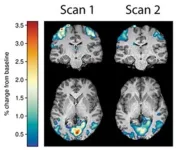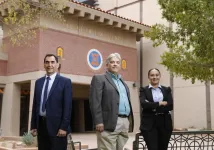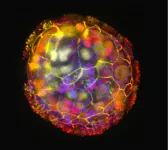(Press-News.org) As part of its ongoing quest to advance better brain health and performance, new research led by Center for BrainHealth at The University of Texas at Dallas investigated neural biomarkers associated with improvements on a brain health index.
The study, “Toward Precision Brain Health: Accurate Prediction of a Cognitive Index Trajectory Using Neuroimaging Metrics,” was recently published in Cerebral Cortex
A total of 48 participants aged 21–65 completed a simple task during a functional magnetic resonance imaging (fMRI) session, then once again approximately six months later after engaging in cognitive training protocols. The researchers derived neural biomarkers from the brain’s hemodynamic (blood flow) response to the task.
At these same time points, participants completed a battery of online cognitive assessments that measure memory, strategic attention and innovation – these holistic assessments produce a composite score of the brain’s holistic fitness, called the BrainHealth Index.
The researchers then trained a machine learning model to predict improvements on the BrainHealth Index based only on the neural markers measured from both visits.
Whereas the BrainHealth Index is derived from self-reported assessments, neural biomarkers provide an objective, physical measure of what is happening in the brain. Just as cholesterol levels are a common biomarker for heart health and heart disease, neural biomarkers can serve not only as early warning systems of brain pathology, but also as markers of improved brain health – as this study demonstrates.
The optimized machine learning model successfully predicted substantial gain on the BrainHealth Index with 90% accuracy, confirming a functional relationship between the Index and the neural biomarkers in a healthy population.
Lead author and director of biostatistics Jeffrey S. Spence, Ph.D., explained, “This study is unique in that our team used a brain biomarker to track brain health rather than disease. Establishing such a clear functional relationship between the BrainHealth Index and this neural biomarker reinforces the value of the Index to measure the state of one’s brain health – without the need for expensive imaging procedures.”
Contributing author Sandra Bond Chapman, Ph.D., founder and chief director at Center for BrainHealth and Dee Wyly Distinguished Professor at UT Dallas stated, “To our knowledge, this is one of the first studies to demonstrate predictive markers of improved brain health with combined neural changes and behavioral gains following cognitive training in young to older age healthy adults.”
“Group findings show statistical significance, but clinical significance is achieved when we can specify at an individual level who benefits or fails to respond to different treatment protocols,” she continued.
“This study takes us one step closer to precision brain health, which will ultimately allow interventions to be tailored to individuals.”This study, focused on markers of brain improvement, was graciously supported by private philanthropy from Sammons Enterprises, Inc.
ABOUT CENTER FOR BRAINHEALTH
Center for BrainHealth®, part of The University of Texas at Dallas, is a translational research institute committed to enhancing, preserving, and restoring brain health across the lifespan. Major research areas include the use of functional and structural neuroimaging techniques to better understand the neurobiology supporting cognition and emotion in health and disease. This leading-edge scientific exploration is translated quickly into practical innovations to improve how people think, work and live, empowering people of all ages to unlock their brain potential. Translational innovations build on Strategic Memory Advanced Reasoning Tactics (SMART™), a proprietary methodology developed and tested by BrainHealth researchers and other teams over three decades.ABOUT CENTER FOR BRAINHEALTHCenter for BrainHealth®, part of The University of Texas at Dallas, is a translational research institute committed to enhancing, preserving, and restoring brain health across the lifespan. Major research areas include the use of functional and structural neuroimaging techniques to better understand the neurobiology supporting cognition and emotion in health and disease. This leading-edge scientific exploration is translated quickly into practical innovations to improve how people think, work and live, empowering people of all ages to unlock their brain potential. Translational innovations build on Strategic Memory Advanced Reasoning Tactics (SMART™), a proprietary methodology developed and tested by BrainHealth researchers and other teams over three decades.
END
Center for BrainHealth publishes new model to predict improvement in brain health
Imaging study successfully predicted outcomes with 90% accuracy
2023-11-30
ELSE PRESS RELEASES FROM THIS DATE:
Scientists find gene therapy reduces liver cancer in animal model
2023-11-30
Researchers at UC Davis Comprehensive Cancer Center have shown that inhibiting a specific protein using gene therapy can shrink hepatocellular carcinoma (HCC) in mice. Silencing the galectin 1 (Gal1) protein, which is often over-expressed in HCC, also improved the anti-cancer immune response and increased the number of killer T cells inside tumors. The study was published in Acta Pharmaceutica Sinica B.
“We’ve long known that Gal1 is a biomarker for hepatocellular carcinoma,” said ...
Air Force awards UTEP Grant to safeguard assets in space
2023-11-30
EL PASO, Texas (Nov. 30, 2023) – Space near earth is teeming with objects, whether natural, like meteors and comets, or manmade, like satellites, spacecraft and rocket debris. But experts still need a clearer picture of the location and state of these objects, which can threaten space-based assets, such as GPS, weather-monitoring and communication satellites.
“The United States is dependent economically and militarily on space assets,” said Miguel Velez-Reyes, Ph.D., chair of the Electrical and Computer Engineering Department at The University of Texas at El Paso. “For ...
Stigmatizing content on social media affects perceptions of mental health care, new study reveals
2023-11-30
Research has shown that social media can negatively impact people's mental health. But can it affect people’s beliefs about mental health treatment?
Yes, according to researchers at Union. In one of the first studies to examine the impact of social media on people’s perceptions of mental health care, researchers discovered that viewing just a few social media posts that mock mental health treatment can have a profound impact on some people's attitudes toward treatment.
The study appears in the latest issue of the journal Social Media + Society.
For the study, 186 participants viewed 10 tweets. The gender ...
New study offers cautious hope about the resilience of redwoods
2023-11-30
New research from Northern Arizona University has explained coast redwood’s remarkable ability to recover from very severe fire, a rare sign of optimism amid a landscape increasingly scarred by severe fires.
The study, published today in Nature: Plants, examined recovery after the catastrophic CZU Lightning Complex Fire, which began in August 2020 and burned thousands of acres of redwoods in Big Basin State Park in California, some more than 1,500 years old. Researchers from NAU’s Center for Ecosystem Science and Society (Ecoss) and the School of Informatics, Computing, and Cyber Systems (SICCS) found, however, that many trees were not dead, as they first appeared. Redwoods ...
The American Institute of Biological Sciences aannounces winner of the IDEAL Leadership Award
2023-11-30
The American Institute of Biological Sciences is pleased to announce Dr. Nyeema C. Harris as the 2023 winner of its Inspiring Inclusivity, Diversity, Equity, Acceptance, and Learning (IDEAL) Leadership Award. The IDEAL Award recognizes commendable leadership in advancing inclusion, diversity, equity, acceptance, accessibility, and learning in the biological sciences community. The award was presented by past awardee Dr. Steward T. A. Pickett on 30 November 2023 at AIBS's Council of Member Societies and Organizations meeting, entitled "Expanding the ...
Thomas Fire research reveals that ash can fertilize the oceans
2023-11-30
(Santa Barbara, Calif.) — Flames roared through Santa Barbara County in late 2017. UC Santa Barbara canceled classes, and the administration recommended donning an N95, long before the COVID pandemic made the mask a household item. Smoke and ash choked the air, but the Thomas Fire’s effects weren’t restricted to the land and sky. Huge amounts of ash settled into the oceans, leaving researchers to wonder what effect it might have on marine life.
Now scientists at UC Santa Barbara have discovered that wildfire ash adds nutrients to marine systems, ...
Study tests firefighter turnout gear with, without PFAS
2023-11-30
Transitioning away from per- and polyfluoroalkyl substances (PFAS), which offer water- and oil-repelling properties on the outer shells of firefighter turnout gear, could bring potential performance tradeoffs, according to a new study from North Carolina State University.
The study showed that turnout gear without PFAS outer shell coatings were not oil-repellent, posing a potential flammability hazard to firefighters if exposed to oil and flame, said Bryan Ormond, assistant professor of textile engineering, chemistry and science at NC State and corresponding author of ...
New study uses genetic data to support use of thiazide diuretics for kidney stone prevention
2023-11-30
Kidney stones affect nearly 10% of the global population. For more than three decades, thiazide diuretics, a common medication used for high blood pressure, have been the standard of care for kidney stone prevention because they reduce the excretion of urinary calcium.
However, recent clinical trials have raised doubts about their efficacy in preventing kidney stones. The NOSTONE trial, published in The New England Journal of Medicine in March 2023, failed to find a protective effect of thiazide diuretics on kidney stone disease.
A ...
Study identifies key algae species helping soft corals survive warming oceans
2023-11-30
BUFFALO, N.Y. --- Scleractinian corals, or hard corals, have been disappearing globally over the past four decades, a result of climate change, pollution, unsustainable coastal development and overfishing. However, some Caribbean octocorals, or soft corals, are not meeting the same fate.
During a two-year survey of soft corals in the Florida Keys, Mary Alice Coffroth, professor emerita of geology at the University at Buffalo, along with a small team of UB researchers, identified three species of octocorals that have survived heat waves. While the coral animal itself may be ...
Scientists build tiny biological robots from human cells
2023-11-30
Researchers at Tufts University and Harvard University’s Wyss Institute have created tiny biological robots that they call Anthrobots from human tracheal cells that can move across a surface and have been found to encourage the growth of neurons across a region of damage in a lab dish.
The multicellular robots, ranging in size from the width of a human hair to the point of a sharpened pencil, were made to self-assemble and shown to have a remarkable healing effect on other cells. The discovery is a starting point for the researchers’ vision to use patient-derived ...
LAST 30 PRESS RELEASES:
ASU researchers to lead AAAS panel on water insecurity in the United States
ASU professor Anne Stone to present at AAAS Conference in Phoenix on ancient origins of modern disease
Proposals for exploring viruses and skin as the next experimental quantum frontiers share US$30,000 science award
ASU researchers showcase scalable tech solutions for older adults living alone with cognitive decline at AAAS 2026
Scientists identify smooth regional trends in fruit fly survival strategies
Antipathy toward snakes? Your parents likely talked you into that at an early age
Sylvester Cancer Tip Sheet for Feb. 2026
Online exposure to medical misinformation concentrated among older adults
Telehealth improves access to genetic services for adult survivors of childhood cancers
Outdated mortality benchmarks risk missing early signs of famine and delay recognizing mass starvation
Newly discovered bacterium converts carbon dioxide into chemicals using electricity
Flipping and reversing mini-proteins could improve disease treatment
Scientists reveal major hidden source of atmospheric nitrogen pollution in fragile lake basin
Biochar emerges as a powerful tool for soil carbon neutrality and climate mitigation
Tiny cell messengers show big promise for safer protein and gene delivery
AMS releases statement regarding the decision to rescind EPA’s 2009 Endangerment Finding
Parents’ alcohol and drug use influences their children’s consumption, research shows
Modular assembly of chiral nitrogen-bridged rings achieved by palladium-catalyzed diastereoselective and enantioselective cascade cyclization reactions
Promoting civic engagement
AMS Science Preview: Hurricane slowdown, school snow days
Deforestation in the Amazon raises the surface temperature by 3 °C during the dry season
Model more accurately maps the impact of frost on corn crops
How did humans develop sharp vision? Lab-grown retinas show likely answer
Sour grapes? Taste, experience of sour foods depends on individual consumer
At AAAS, professor Krystal Tsosie argues the future of science must be Indigenous-led
From the lab to the living room: Decoding Parkinson’s patients movements in the real world
Research advances in porous materials, as highlighted in the 2025 Nobel Prize in Chemistry
Sally C. Morton, executive vice president of ASU Knowledge Enterprise, presents a bold and practical framework for moving research from discovery to real-world impact
Biochemical parameters in patients with diabetic nephropathy versus individuals with diabetes alone, non-diabetic nephropathy, and healthy controls
Muscular strength and mortality in women ages 63 to 99
[Press-News.org] Center for BrainHealth publishes new model to predict improvement in brain healthImaging study successfully predicted outcomes with 90% accuracy




